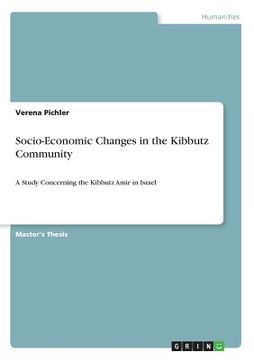Share
Socio-Economic Changes in the Kibbutz Community: A Study Concerning the Kibbutz Amir in Israel
Verena Pichler
(Author)
·
Grin Verlag
· Paperback
Socio-Economic Changes in the Kibbutz Community: A Study Concerning the Kibbutz Amir in Israel - Pichler, Verena
Choose the list to add your product or create one New List
✓ Product added successfully to the Wishlist.
Go to My Wishlists
Origin: U.S.A.
(Import costs included in the price)
It will be shipped from our warehouse between
Thursday, July 04 and
Tuesday, July 16.
You will receive it anywhere in United Kingdom between 1 and 3 business days after shipment.
Synopsis "Socio-Economic Changes in the Kibbutz Community: A Study Concerning the Kibbutz Amir in Israel"
Master's Thesis from the year 2018 in the subject Sociology - Social System and Social Structure, grade: 4, Stockholm University, language: English, abstract: This study seeks to examine the socio-economic changes experienced in the Kibbutz Amir in Israel. At the same time, it wants to offer clarity on the academic and societal significance amidst the changes experienced. As such, the study aims to investigate the Kibbutzim ideology and the implication of the changes that are embraced after the collapse of the agrarian-social system practiced by the community members in this context. In order to understand the implication of these changes, a qualitative approach will be embraced, with the recruited members from the Kibbutz community participating into face-to-face interviews. The complexity of the Kibbutzim socialism model is attributed by different studies that account for the livelihoods of the people at the Kibbutz. The Kibbutz was based on a phenomenal strategy according to which everyone was equal and that property was communal. The community attributed the Kibbutz as a large family, which the socialism manifested by sharing job roles and even sharing clothes. The socialist model accounts for the social values of collectiveness and equality among members of a community. Faced with social pressures and economic constraints, the Kibbutz Amir went through significant phases and as the change took effect, the traditional equalitarian model was disbanded. Therefore, the present study seeks to understand the experiences, thoughts, and perceptions of the members of the Kibbutz Amir regarding the phases and the implication of the changes. This study utilizes a qualitative research method to collect data from the research subjects selected purposively.
- 0% (0)
- 0% (0)
- 0% (0)
- 0% (0)
- 0% (0)
All books in our catalog are Original.
The book is written in English.
The binding of this edition is Paperback.
✓ Producto agregado correctamente al carro, Ir a Pagar.

